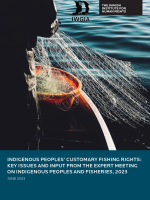
Indigenous peoples’ customary fishing rights – Key issues and entry points for advocacy
Background
Indigenous Peoples’ rights in the context of fisheries are still not well understood or reflected in laws and policies. Consequently, there are numerous examples of Indigenous fishers being criminalized for simply practicing their customary fishing rights. This may be further aggravated if the establishment of Marine Protected Areas and other conservation measures are undertaken without the meaningful participation of Indigenous Peoples, and without the consideration for their traditional knowledge.
In recent years, the Institute has worked to highlight and address the impacts of human rights on Indigenous Peoples’ rights within the fisheries and aquaculture sectors, as part of "Sustainable Oceans - pursuing a human rights-based approach to fisheries and aquaculture" project.
In this context, the Institute and IWGIA convened a hybrid Expert Meeting with technical support from FAO at the margins of the 2023 Session of the UNPFII. The overall objective of the 2023 Expert Meeting was to examine the impacts of fisheries governance and related policies on the rights of Indigenous Peoples in regard to traditional fishing and to inform the response to the recommendations put forward by the United Nations Permanent Forum on Indigenous Issues.
Summary
This report provides an overview of key issues related to the sub-themes discussed at the 2023 Expert Meeting, as they relate to Indigenous Peoples’ rights:
- Governance of tenure in fisheries
- Conservation measures
- Socio-economic impacts
- Fisheries subsidies
- Criminalisation of Indigenous Peoples’ fisheries
- Links to global policy processes and initiatives, including the Global Biodiversity Framework, the advancement of the SSF Guidelines, the UN High Seas Treaty, among others.
The report suggests targeted opportunities and entry points for advocacy to further Indigenous Peoples’ rights within the fisheries and aquaculture sectors. Pursuing these strategic opportunities will require concerted efforts, sustained support and financial resources for training, capacity-building, and networking among Indigenous Peoples. Annex A contains an overview of potential entry points, as identified by the 2023 Expert Meeting, which can hopefully inspire further engagement.
The report is based on three main sources of information:
- Previous publications of the Institute on Indigenous Peoples’ rights and fisheries
- Cases from across the globe concerning Indigenous Peoples’ rights and fisheries, compiled by the Danish Institute for Human Rights
- Input from the participants of the 2023 Expert Meeting
We strive to make the pdf versions of our publications etc. accessible for screen readers. If you experience any problems, please contact Digital Editor Stine Juhl Nielsen on stni@humanrights.dk
